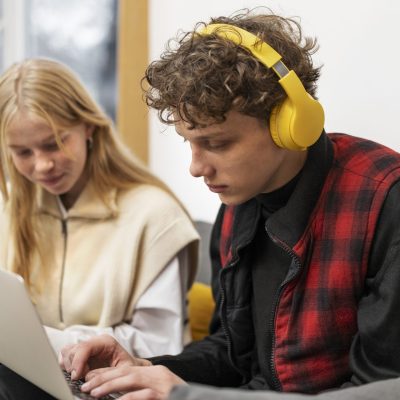Online classes give a new way to learn about special education. These classes offer many good things like freedom. They are also easy to get and do not cost a lot. But, they are still handy ways to learn. But, we need to think hard before picking one. When choosing an online class, you should look at what it teaches. Look at what other students say about it and how much it is worth. This can help you pick the best class. Let me tell you more about this.
Getting an online special education degree offers flexibility. You can balance study with work or personal duties. It also gives access to more programs. It lets people learn at their own pace.
Inhalt
- 1 Pros and Cons of Online Special Education Courses
- 2 Resources Available for Online Special Education
- 3 Plans for individual learning are key. They are a big part of online special education. Understanding them is crucial.
- 4 Environments for learning online can be flexible. This is true for special education.
- 5 Impact of Technology on Online Special Education
- 6 Here are guidelines for picking a special ed program online.
Pros and Cons of Online Special Education Courses

Online education holds immense promise. It promises much. It’s for new and experienced special ed teachers. Let’s start on a positive note. What are the benefits? You get to take them online.
Advantages
Flexible timing is a big plus for online education programs. Teachers have the choice to set work hours that fit their daily routine. This helps balance their job duties and home chores. It also aids in their professional growth. Such flexibility benefits educators. They may work full-time or part-time jobs. It lets them get good training. It does not disrupt their jobs. They can attend classes whenever convenient. The schedules vary. They do this to fit varied commitments. Short words are easy to read. Simple sentences are too.
Offering courses online makes education accessible. It helps people in remote areas or with limited mobility. They can access special education. It would otherwise be out of reach. This makes sure that talent isn’t overlooked. This is because education is becoming more fair. It happens due to geographical or physical limits.
Many online courses have lower fees. They cost less than in-person programs. Teachers can also save money on other things like travel and housing. This makes online special education courses cheap. They are a good choice for professional growth.
But, we must think about the bad sides too. Let’s look at some challenges with online special ed courses.
Herausforderungen
One key challenge is the lack of hands-on experience. It’s hard to copy teaching or therapy methods. They’re hard to do online. Some special education focuses on practical skills. They teach less effectively. They teach them this way. Virtual platforms teach them.
Online courses may have few chances for in-person teamwork. This is not like traditional classrooms. They have more of them. The lack of face-to-face interaction could harm some skills. It could also harm teamwork. These parts are vital in special education.
Technical challenges abound. Access to reliable internet and technology can be hard. They pose big challenges for some trying to do online education. Technical issues may hinder learning. They create barriers for students. The students lack easy access to needed resources.
Weighing the pros and cons is crucial. This is when deciding to take special ed courses online. Online learning has many advantages. It is flexible, accessible, and cost-effective. But, we must also acknowledge its limits. These include experience working with their hands. They also include social interaction. They also have technical obstacles. Educators might encounter these in online instruction.
Using online special education resources requires thought. It requires care. You must make informed decisions. Now, let’s look at the many resources available. They help educators. The educators are taking online courses. The courses are on special education.
Resources Available for Online Special Education

Online special education courses often offer many helpful resources. They support students in their learning journey. These resources aim to improve understanding. They cover key ideas. They also cover how to teach and intervene.
Online Lecture Videos
Many online programs offer a valuable resource. They provide access to full video lectures. The lectures cover many aspects of special education. They provide detailed explanations of teaching strategies. They cover ways to intervene in behavior and the newest research. This lets students talk to expert educators. They can gain valuable insights from home. Accessing these lectures online is flexible. It lets students review topics. They can revisit them as needed. This reinforces their learning.
Some programs may also offer live webinars. They are part of the lecture series. They let students join live discussions. Students can chat with instructors and classmates. These sessions can add to learning. They do this by creating collaborative environments. They also provide instant feedback. They also give clarification on complex topics.
Virtual Libraries
Besides to video lectures. Virtual libraries are crucial. They support online special education students. The repositories offer many e-books. They also have research papers. They have academic journals. They focus on topics. These topics are important to special education. Students can access these resources at any time. This helps independent study and research. Access to many scholarly materials helps students. It lets them explore diverse views. It also lets them stay updated on new trends and cite good sources in their work.
Also, virtual libraries help students learn more. They can deepen their understanding. They will learn about proven practices. They will also learn about how to assess and include students. They can do this with literature reviews and case studies. They are at their fingertips.
Digital Tools
Online special education courses have added digital tools. They give students more support. The tools may include virtual simulations. They may also include interactive platforms. They may also include special software. They may also include educational games. The tools tailor to the needs of learners in special ed. Digital tools let students use immersive learning. The experiences simulate real-world scenarios. They also let students refine their use of theory. They also help them develop practical skills. These skills are essential for the classroom.
For example, simulations let students practice two things. They can practice making IEPs for different students. They can also model scenarios. They are about managing behavior. Specific case studies serve as the basis for these. These experiences are hands-on. They gain practical expertise. This expertise reinforces the theory from coursework.
Accredited online special education programs empower students. They give access to great resources. These include online lectures. They also include virtual libraries. They also include digital tools. These resources help students. They give them knowledge, skills, and support. They need these things to do well in their studies and future careers. They will be special education professionals.
We are now moving into the next chapter of our exploration. We are looking at online programs. They are for special education. Now, we’ll focus on understanding plans for personalized learning. These plans are a key part of inclusive education. They foster it.
Plans for individual learning are key. They are a big part of online special education. Understanding them is crucial.

In the realm of education, one size certainly does not fit all. Every student is unique. They have their own strengths and challenges. This is especially true. It is true for students with disabilities. They need special support. It will help them reach their full potential.
ILPs, often called ILPs, personalize the roadmap for each student. They design them to meet the exact needs of disabled students. The plans are carefully tailored. They outline goals, support, and teaching methods. Each student has unique attributes. These attributes form the basis for them. These include their strengths and challenges. Also, their learning style and preferences.
The main goal of an ILP is to ensure each student gets an education tailored to their needs. This includes academic goals. It also includes support services. These are the needed accommodations.
Consider this: An ILP is a compass. It guides educators and parents. They help students through their academic journey.
Components of an ILP
The key parts of an Individual Learning Plan can vary. They depend on the student’s needs and the resources available to them. But, ILPs often include these common elements:
-
Goals and Objectives: ILPs need clear objectives. These objectives must be measurable. They must cover academics and functioning. They are a cornerstone of any ILP. We design these goals with a focus on individual needs and areas for growth.
-
Specialized support services exist. They include speech therapy. They also include occupational therapy. They also include behavior interventions. We customize the programs. They meet the student’s specific needs.
-
Accommodations adjust the learning environment or materials. They ensure that the student can access learning in a way that fits them.
-
Progress Monitoring is key. It helps educators see if current approaches work. It shows if they need changes.
-
ILPs for older students. They also include transition planning. This outlines paths for college. It also covers job opportunities.
These elements combine to make a roadmap. It outlines how each student will get an education that fits their needs.
For instance, a student may have dyslexia. Their ILP may include accommodations. These may include providing audio books. Or, they may include extra time for reading.
Understanding IEPs in online special education is crucial. This is true not just for educators, but also for parents and students. It empowers everyone in a child’s education. They can work together well. It’s for the child’s success.
Next, let’s explore how to develop an effective ILP. We’ll also look at its impact on online special education.
Environments for learning online can be flexible. This is true for special education.
Rare chance. You can find them online. You can learn from home. They let you learn in the way that works best. Students can study in a very relaxed and easy setting. This setup is super flexible, unlike regular schools. It is awesome for students with disabilities who find it hard to go to campuses. Students can access coursework from anywhere. This lets them make a custom learning space that fits their needs and likes perfectly. The classes can move at their own pace in an environment suited for them.
Flexibility is key for disabled people. It applies to their learning environments. No barriers. They let students join in activities. They are not limited by travel problems. They are not limited by inaccessible buildings. Online special education programs let students focus. They can focus fully. They focus on their coursework. They can join discussions. They can do assignments and take tests. They can do this without the stress of navigating places that may not fit their needs.
This flexible approach extends beyond access. It also fits many learning styles. It fits many preferences. Students with disabilities benefit from personalized teaching. It uses methods and pacing that fit their strengths. They also fit their challenges. In an online setting, teachers can use many teaching strategies. They can also use many resources. They can use profiles that match their students. Each student’s profile is unique. This promotes a more inclusive education. It also makes it more tailored.
Also, online learning is flexible. It helps students manage their schedules. Many people have disabilities or health problems. They may have bursts of energy. They may also have sudden medical appointments. These make it hard to stick to rigid class schedules. Students can take part. They can do so in online special education programs. They can engage with course materials at their most alert and ready times. This helps. It makes education better.
Online special education programs are adaptable. They support making a more inclusive community. Students get to talk with peers. The peers are from diverse places and backgrounds. This fosters a rich exchange of views and experiences. Also, the virtual environment promotes independence. It also promotes self-advocacy. Students navigate their education with more control. We will explore how tech has changed online education. This is for students with special needs. This is in preparation for our next phase.
Impact of Technology on Online Special Education
The digital landscape is advancing rapidly. Technology has made great strides. It has changed how teachers treat special education students. Using tech tools has lifted barriers. It has opened paths to learning. The learning is inclusive and personalized.
Online special education relies on assistive technology. This is key. It ensures that all students can access and engage with content. This includes many tools. They include screen readers. They also include speech recognition programs. They also include electronic worksheets. These technologies are for individual learning styles. They also help with the challenges that students face.
For instance, consider a student with dyslexia. They struggle with reading. They can use assistive technology. For example, they can use text-to-speech software. It reads the content to them. This helps them to comprehend the material. This personalization empowers students. It gives them tailored support. The support fits their needs.
Also, adding augmented reality (AR) has helped online special education a lot. AR applications have changed learning. They create immersive environments. In these places, we can see theoretical concepts. Interactive simulations and 3D models help. They let students understand abstract topics deeply. And, they do so while actively engaging in their lessons.
AR provides a multi-sensory way to learn. It boosts memory. It also makes students take part more and want to do better. This dynamic way delivers content. It shows how tech has enriched teaching. It is very helpful. This is true for learners with diverse needs.
Educational apps also help a lot. They are key in online special education. They offer many resources. The resources are for self-learning. They are also for building skills. These apps cover many subjects. They have features. These include customizable interfaces. They also have adaptive exercises. They track progress in real time. For instance, language development apps have pictures. They also have games. They help kids with speech issues.
Math apps can do the same. They show concepts with clear pictures. They also offer chances for practice. You can practice until you master it. These tools are interactive. They foster an engaging learning environment. They also let educators check student progress.
Technology has impacted online special education. It does more than just give access to content. It enriches learning by embracing diversity. It meets individual needs. These technological advancements empower educators. They can use the tools to create inclusive learning spaces. The spaces empower people. These settings help students grow. They grow academically and personally. They help all students.
Technology has had a big impact. It has changed online special education. Now, let’s turn our focus to gaining insights into wise measures. They are for navigating the many online special ed programs.
Here are guidelines for picking a special ed program online.
Getting a master’s in special education takes much time. It also takes money and effort. So, it’s key to evaluate your options carefully. Do this when picking an online program. Here are some key guidelines. Consider them. Use this advice. Follow it. Do so when you choose an online special ed program.
Comprehensive Curriculum
A full curriculum is key. It helps you gain the knowledge and skills. You need them to address many learning needs. Look for programs with a well-rounded curriculum. They should cover topics. These include data-based strategies and evidence-based teaching. Also, look for coverage of program development. It should also cover behavior interventions. It should also cover the legal and ethical issues. It should focus on those in special education. A strong curriculum gives a solid education. This education is essential for success in special ed.
Faculty Expertise
Faculty members’ expertise and experience are pivotal. They deliver high-quality instruction and mentorship. Check the faculty profiles. Make sure they have the right experience. It should be in special education. Also, make sure they bring diverse views to the program. Experienced faculty can offer helpful insights. They can also offer guidance. They enrich your learning. They prepare you to face real challenges. The challenges are in special education.
Unterstützungsdienste für Studenten
Support services can help students. They are available. They can impact your academic journey. Look for programs with full support services. These include advising. They also include help with careers and tech. These services are crucial. They can help you with tough coursework. They can help you find career opportunities. And they can fix any technical issues in your studies. They help students. They make learning supportive. They also enhance your academic experience.
Consider these guidelines. It’s important to see how each factor aligns with your goals. This is true for your goals and aspirations in special education. Each aspect adds to a well-rounded education. It prepares you for success in this dynamic field.
In the end, the right online special education program involves following these rules. Do so carefully. You must do this alongside your individual goals. This full approach will empower you to make an informed decision. It will align with your goals and set the stage for success in special education.
Der zukünftige Erfolg Ihres Kindes ist unser oberstes Ziel bei Legacy Online School. Besuchen Sie unser Website um die vielen Möglichkeiten der Legacy-Onlineschule zu erkunden.
Informieren Sie sich über die Online-Schulprogramme von Legacy:
Die Grundschule der Legacy Online School Programm legt die Messlatte hoch. Dies ist eine hochwertige Ausbildung. Wir sind bestrebt, Neugier zu wecken. Wir bemühen uns auch, die Kreativität zu fördern. Wir bieten einen soliden Lehrplan. Unterstützt werden wir dabei von qualifizierten Pädagogen.
Legacy Online Mittelschule bietet digitale Bildung. Sie ist für Schüler der Mittelstufe gedacht. Die Schule ist stolz darauf, Live-Online-Kurse anzubieten, die von zertifizierten Lehrern unterrichtet werden. Der Unterricht findet online und interaktiv statt.
Legacy Online High School ist eine einzigartige Methode des Online-Lernens, die speziell für Oberstufenschüler entwickelt wurde. Sie kombiniert synchrones Lernen, ein breites Spektrum an pädagogischen Methoden und einen Schwerpunkt auf Zugänglichkeit.
Die Legacy-Onlineschule bietet das Beste Lehrplan
Unser strenger Lehrplan gewährleistet, dass die Absolventen gut auf Universitäten und Arbeitsplätze in der ganzen Welt vorbereitet sind. Darüber hinaus verbinden unsere dynamischen virtuellen Clubs Studierende auf der ganzen Welt.






